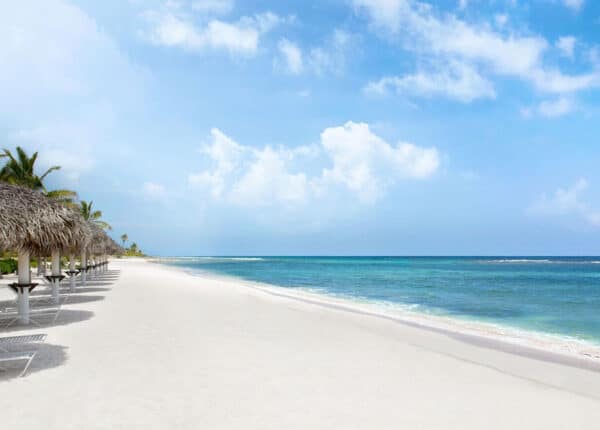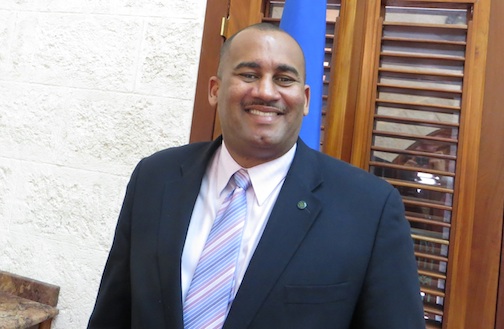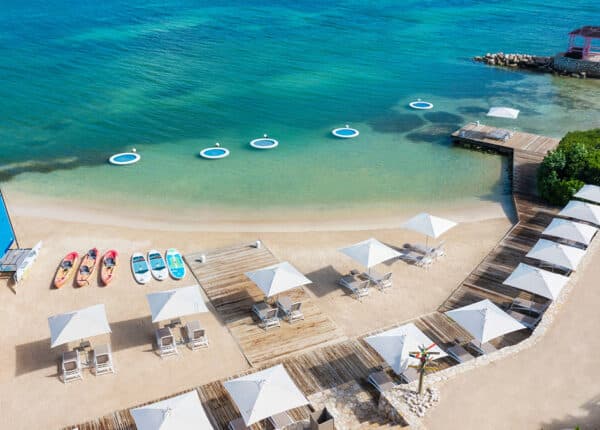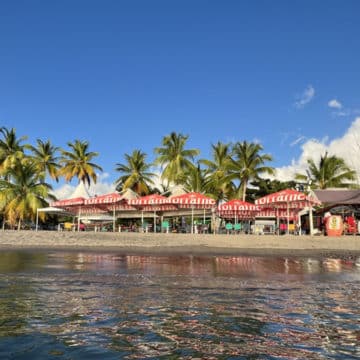Interview with Barbados Minister of Tourism Richard Sealy
Above: Tourism Minister Richard Sealy (CJ Photo)
By Alexander Britell
The Caribbean tourism sector is in a period of change, as the region seeks to emerge from the global downturn. As Caribbean nations like Barbados look to move beyond the traditional “sun, sand and sea” attraction, they are increasingly moving to diversify their tourism product — from areas like medical tourism to events-based product. And with continued financial uncertainty in some of the Caribbean’s feeder markets like the United States and Europe, the region is starting to look at new markets — from emerging power Brazil to the Far East. To learn more about how Barbados is working to move its tourism sector into the future, Caribbean Journal talked to Tourism Minister Richard Sealy about the promise of events tourism, the potential of Latin America and the Chinese question.
Where is Barbados’ tourism sector today?
“Right now, in many respects, we are at a crossroads. The truth is that we have had some challenges, like everyone else, since 2008. 2009, of course, was the real low point. Generally speaking, there was a huge decline in the demand for tourism services globally, so most, if not every serious destination on the planet had a decline year in 2009. Since then, in 2010 and 2011, we have started to pick back up, and we’ve actually seen some fairly nice increases over that period. 2011, for example, was a 7.2 percent increase over 2010. So there’s every indication that we’re on the increase, in terms of arrivals, and that certainly tells me that the brand is still quite strong — that we’re still a very desirable place out there in the market. And we can still get our fair share. What is of particular concern though, even during those recovery years, is the decline in spending. More people are traveling on tighter budgets, and that is something that would concern us. In the travel and tourism competitiveness index, Barbados ranks as one of the top destinations in the world, in terms of our capacity to extract spending per tourist. So when we see people trading down, with shorter vacations, going to a three-star instead of a four-star, when you see that occurring, it will impact us from a macroeconomic point of view. It means our response has to keep that in mind. But, concomitant with that, we are a mature destination. We’ve officially been in the business since the early 1950s — unofficially, since the 1700s — and people have been coming here for rest and recreation and recuperation from the temperate countries. But the truth is, 50 years is a long time, so you can rethink what you’re doing and how you’re doing it. What we’ve been promoting as a government is restructuring, reworking our institutional makeup, reworking how we do business, how we position ourselves, what markets we target. It’s appropriate, after a half-century, that we do those things. But you have, concomitant with that, this economic crisis of unprecedented magnitude, and, with those two very robust realities, we have got to rework how we function. And I think that is what is occurring right now, from my level, as the chief policy maker for tourism in Barbados.”
What are your ministry’s major priorities for tourism in Barbados?
“There are a couple of them. Something as simple as a master plan. We’ve never had that. All the development in tourism has been on an ad-hoc basis. Now that doesn’t mean that it wasn’t planned properly within some context — a physical development plan or a national development plan. But we haven’t had a tourism master plan for the destination and the nation-state, which is one and the same. In other parts of the world, you have the nation of Mexico, but then you have Cancun, Cozumel. In Jamaican you have Ocho Rios, Montego Bay, Negril — different destinations within a single nation-state. We don’t have anything like that here — Barbados and the nation state are one and the same. So we are developing a master plan. So that’s one. And two is that we have developed a white paper for tourism, which is the government’s policy. And coming out of that will be the master plan, which will give us the blueprint for the next 20 years, for exactly how we want to see tourism develop. That is a significant initiative, because, for the first time, policymakers and operators, private sector players, partners local and abroad, can have a blueprint that they can extract from in terms of understanding what our objectives are. Also part of that is the restructuring of the institutions that govern tourism. You have the ministry and you have the Barbados Tourism Authority. But we’ve found that, strictly speaking, that may not be structurally the best way to respond to today’s needs. You have a scenario where the BTA is a statutory corporation established under the laws of Barbados. And maybe we need to have something a little more private-sector oriented to respond quicker to what the demands are. We’re in the information age. Everything is happening so swiftly and quickly. We are on the road of information and communications technology, including with respect to travel and tourism. So we have to have the appropriate institutional makeup. I think those are the two most significant things that are occurring overall.”
What are your longer-term goals?
“One is trying to become a truly global brand. For too long, Barbados has, in essence, been relying upon North America and the United Kingdom for the brand of our tourists that come from outside the region. So it’s basically the UK, the US and Canada. Those have been our major source markets that have jockeyed for first-place position. Right now, the UK has had a long run. There was a time when Canada was number one. There was a brief period when even the US was number one as well. So they have jockeyed for that top position. It is a very desirable destination, one that has a high rate of repeat visitorship — which, to my mind, suggests a high level of satisfaction. A customer doesn’t go back to the restaurant over and over again if he’s not satisfied. So we have the capacity to satisfy. But yet, we have restricted ourselves only to a few regions and source markets. So we are trying to broaden that.
What about continental Europe?
We’ve had a traditional relationship with continental Europe for a long time, but for too long, it has been only a smattering here and there. But with the relationship we have now with [air carrier] Condor, doubling the capacity of Frankfurt, we’re seeing more Germans. And that will allow increased airlift over the UK to connect through London. So we’re getting more Germans, more Europeans. We’ve also identified Scandinavia for more attention. We had a very successful charter in the winter season to the Nordic. Next winter season we’re going to be looking at Stockholm and Helsinki. So we definitely see Scandinavia as an area with a lot of potential. Of course, we operate a flight out of Brazil by GOL from Sao Paulo, that started in June 2010, and that has been working out quite well. But the wider point is seeing ourselves an international brand. We know about the BRIC countries — these are not basket-cases. There is a lot of wealth, a lot of disposable income, people that want to travel, want to enjoy the nicer things in life, including a warm island destination. And we have to be out there offering it, we have to get into other parts of the world. We’ve initiated the process of China. The Chinese are starting to travel more and more, and we had a group here last year during the summer, and we want to see how we can develop that, how we can get more business from Asia, and to start to position ourselves as having tourists from all over. And I want to make clear — we are not in any way looking to subtract or take away from our traditional sources markets — far from that. We have been getting over 70 percent of our visitors from the Northeastern Seaboard. We just started a direct flight from Dallas, Texas, and that flight was set up because we saw that coming out of the Southwestern US and the West Coast. Because we do think there is more American business that we can get. That was the thing when we engaged with WestJet in 2008. They’re coming out of Toronto, but it is based in Calgary, and it’s a well-established brand in those provinces, like Saskatchewan, Alberta and the like. We think there is more business to be had from those traditional markets.”
What are some of the ways you can do that?
“A very important market is events-based tourism. And looking at the possibilities of sports tourism has worked very well for us. And yes, the traditional spots — golf, cricket, etc, are successful, but we’ve noticed that sailing has been coming on very strong recently. There are six polo fields in Barbados now. So we think that the 63-odd sporting disciplines practiced in Barbados have produced an excellent platform for us to get business in the past, and we can continue to forge that sports tourism fusion and development. But events can, of course, be anything.”
Is there one niche that can be most successful for you?
“Sports tourism, as a niche, has probably served us better than any other, but, potential-wise, I would broaden it and say any events-based tourism. It doesn’t have to be a sports event. The Barbados Food, Wine and Rum Festival, which had its third edition this year, attracted good numbers in the first two occasions when it was held. So culinary tourism, with the variety of experiences we offer, has potential. I’m just thinking ahead, but seeing how these food festival have done — in Aspen, in South Beach in Miami, the New York Food Festival, even Taste of London, the potential that we have in that could probably surpass any other event. I think the sky’s the limit — 10 years from now, where the festival could be. That is one I would put an asterisk next to. But I don’t want to, in any way, take away from the full gamut. And the point is to keep something in your calendar. Faith-based tourism has tremendous potential. So I think it’s important to keep something in your calendar and keep it sufficiently diversified so you have something to pull people here and not only rely on your natural gifts. So that’s something we’ve been trying to explore with great effect — the relationship with Rihanna, and having the Rihanna concert and having her work with the destination is aimed precisely at that. “
You mentioned looking to Central and South America. Obviously the airlift has to be there. But what are some of the ways you’re looking to capitalize on those markets?
“Well, the airlift is an inhibitor. But the truth is it’s probably easier to get to Barbados than any other island in the Eastern Caribbean, and it’s even easier than from certain places than from any other part of the Caribbean period. It’s a little clumsy, having to fly north then fly back south. But we have the two daily flights out of Miami, and of course, we have the daily flights out of New York — JFK, Jet Blue, the Dallas flight. We have connections into Guyana, which is part of South America, and Trinidad. So it is possible to connect and get here. Fortunately, we have, at the moment, the direct flight from South America — the GOL flight. But we are actively looking at other gateways as well.”
What are those other markets?
“The next natural place for us to look obviously would be Panama. Panama is not a very large country in terms of population, but it’s strategic for several reasons — as a logistics hub for Central America and North and South America. They have really built upon the canal — there’s so much more than that. The largest free port this side of the Atlantic, the second-largest in the world after Hong Kong. There’s a financial services sector. They’re really doing very well. Their per-capita income is actually almost on par with Brazil, which is obviously the 900-pound gorilla in the room when you’re talking about Latin America. But we have strong historical connections with Panama. Around 30,000 Barbadians, more than 110 years ago, went to Panama to basically help construct the canal. And many of them remained. The ones that remained, their surnames remained. So you go to Panama now, and meet people who are Panamanians, which a name like mine. So there is a strong connection, and we want to leverage that. Tocumen Aiport is a serious hub. And there are all sorts of possibilities Latin America if you have a direct flight coming from Tocumen. So we’re working on that. We’ve been talking to COPA, to other providers of airlift. And it looks like we might be making some progress with that, and that opens us up to all sorts of possibilities with that fantastic network that COPA has. And if we work with Brazil and GOL, an excellent low-cost carrier, we’ll be fine. I’ve been monitoring the LAN-TAM merger. LAN Chilean is, again, a top airline. It’s actually ranked as one of the best airlines in the world. I’m not going to rush into their office, but certainly we look forward to what’s going on in Latin America. We have to start to have the appropriate relationship with the providers of airlift, because that is certainly a big point in developing that market. I would think that if Latin America had a chance of flying to us, or to have to go fly across the Pacific to get a warm island experience, they would come here.”
You mentioned China earlier. How much potential does China have for tourism in Barbados?
“It’s limitless really. The United Nations World Tourism Organization is saying that, by the year 2020, one out of every five global tourists will be from the People’s Republic of China. Even now, they’re big, big, big players. I’m suggesting that there is some fascination with the Caribbean with the Chinese. And we have to make sure that we can get some of that business. It’s still highly regulated, but Barbados enjoys Approved Destination Status from China, which allows registered groups with registered companies to come to your destination. To what extent the PRC will liberate travel for its citizens, I can’t say. But, certainly, there is enough there for us to work with. And I cannot ignore China. The Renminbi is still quite strong, and I’m aware there is a lot of pressure for them to weaken that. That may soften some of the demand. Tourism, as an industry, is exquisitely sensitive to currency rates of exchange. But whether the Renminbi is weak or strong, the sheer size of that market, and its overall economic might, we need to make sure that we’re there. Barbados opened a mission in Beijing only in August 2010. We’ve had diplomatic relations with China for a long time. And it’s headed up by former Prime Minister Lloyd Erskine Sandiford, who was also the Minister for Tourism for a short period. So he is very aware of the fact that with such a big country with a tremendous manufacturing base, the only possibility for us to narrow that trade imbalance is services. We need to get the tourism element. Only recently, we were looking at to advance the effort at getting Chinese tour operators to start to focus on Barbados as a possibility, whether as a standalone or maybe as part of a multiple-destination vacation. That’s another thing the Chinese have shown. If you’re going to travel this far, you want to see maybe a couple of islands, or maybe see the mainland and an island. So you do New York and some other US city and then do Barbados. Or you do South America and Barbados. So those are the kinds of discussions we are having. I don’t think you’ll see 10,000 Chinese visitors in Barbados in 2013, but we certainly trying to lay the groundwork more.”







